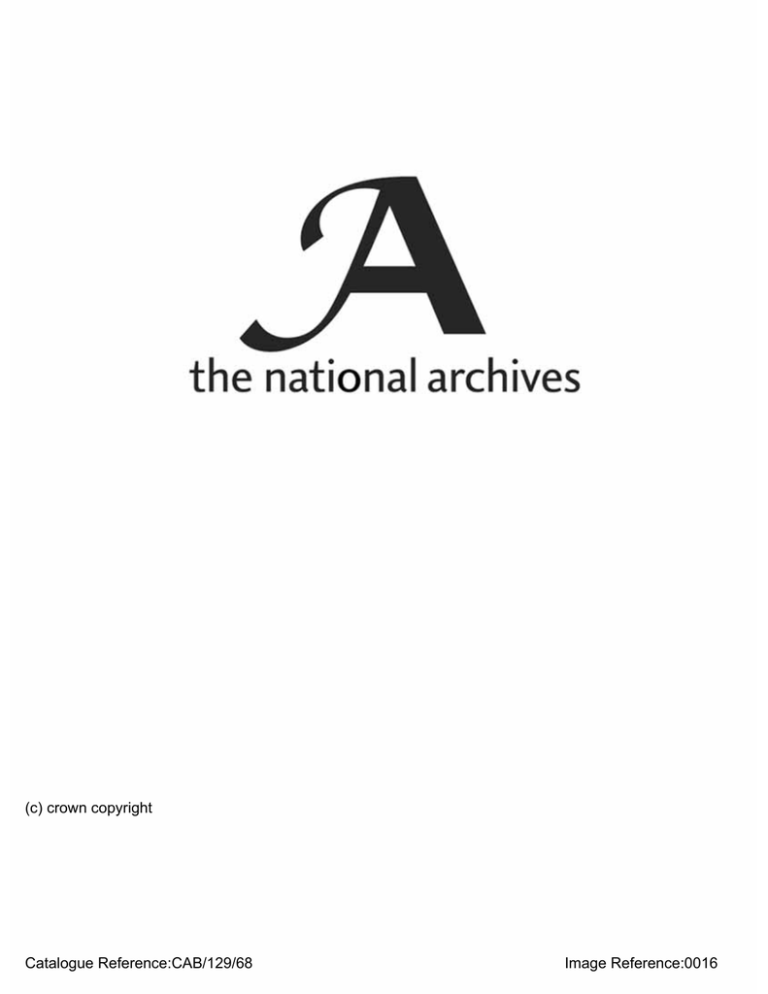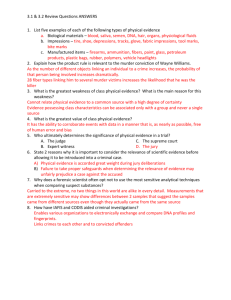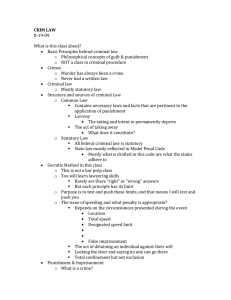(c) crown copyright Catalogue Reference:CAB/129/68 Image Reference:0016
advertisement

(c) crown copyright Catalogue Reference:CAB/129/68 Image Reference:0016 Printed for the Cabinet. S ECRET CABINET C. (54) 166 19th May, May 1954 OFFICE Copy N o . RECQfiD COPY 1954 CABINET REPORT O F T H E R O Y A L COMMISSION O N CAPITAL PUNISHMENT MEMORANDUM BY THE SECRETARY OF STATE FOR THE HOME DEPARTMENT AND MINISTER FOR WELSH AFFAIRS AND THE SECRETARY OF STATE FOR SCOTLAND We submit our conclusions on the recommendations of the Royal Commission on Capital Punishment. The Terms of Reference 2. The terms of reference of the Commission were as follows: — " T o consider and report whether liability under the criminal law in Great Britain to suffer capital punishment for murder should be limited or modified, and if so, to what extent and by what means, for how long and under what conditions persons who would otherwise have been liable to suffer capital punishment should be detained, and what changes in the existing law and the prison system would be required; and to enquire into and take account of the position in those countries whose experience and practice may throw light on these questions." T h e Commission was precluded from considering whether capital punishment should be retained or abolished. They were in effect required to consider whether any practicable half-way house could be found between the existing law, under which every person convicted of murder (except a person under 18 or an expectant mother) must be sentenced to death, and the abolition of the death penalty. The Commission were also asked to consider whether any change should be made in the method of execution and to examine some subsidiary questions which did not strictly fall within their terms of reference. The Major Recommendations 3. The most important recommendations are the three following: — (a) that the statutory age limit below which the sentence of death may not be imposed should be raised from 18 to 2 1 ; (b) that in all other cases the jury should be given discretion t o decide whether there are such extenuating circumstances as to justify substituting the sentence of imprisonment for life for the sentence of death; and (c) that the test of criminal responsibility laid down in England by the M ' N a g h t e n Rules should be wholly abrogated and that the jury should be left to determine, unfettered by any formula, whether at the time of the act the accused was suffering from a disease of the mind or mentally deficient to such a degree that he ought not to be held responsible. Of these recommendations, the first and the third are not unanimous. The second is put forward in qualified terms, falling short of a clear recommendation. The three recommendations are considered in paragraphs 4-11 below. Raising the Age Limit 4. The Commission recommend the raising of the age limit by a majority of one (six to five). The recommendation is based mainly on the view that persons under 21 cannot be regarded as fully mature, and, however heinous their crimes, are often capable of reformation. The minority express the view that 46174 65 where a murder is committed by a youth of 19 or 20 who has a criminal record and shows no apparent signs of special immaturity or instability, there is no sufficient reason for exempting him from the scope of the death penalty, and they consider that it would be dangerous and inopportune to raise the age limit at a time when crimes of violence on the part of persons between 17 and 21 are so prevalent. We agree with the minority. Vesting of Discretion as to Sentence in the Jury 5. The Commission say that " the outstanding defect of the law of murder is that it provides a single punishment for a crime widely varying in culpability "-; that this " rigidity " is at present mitigated mainly by the use of the Prerogative of Mercy, a method in their view open to criticism; and that they have, therefore, sought for some other method of doing what is now done by the exercise of the Prerogative. 6. The Commission reject proposals for the division of murder into two degrees, on the ground that it is impossible to frame a satisfactory definition of murder in the first degree, " because no legal definition can cover all the multifarious considerations, relating to the offender as well as to his crime, which ought to be taken into account (and are at present taken into account by the Secretary of State) in deciding whether the supreme penalty should be exacted in each individual case." With this conclusion we agree. 7. The Commission argue that the only practicable way of limiting the present liability to suffer capital punishment would be to leave the present scope and definition of murder unaltered and to " give either to the Judge or to the jury a discretion to decide in each particular case, in the light of all the information before the court, whether the sentence of death is appropriate, and, if it appears to them that it is not, to impose or to recommend a lesser punishment." They reject the proposal that such a discretion should be given to the trial judge; and conclude that the alternative of entrusting such a power to the jury is said to work well on the whole in the countries where it has been adopted, that if it were adopted in Great Britain a workable procedure could be devised, and that it is " the only practicable way of enabling the courts, instead of the executive, t o take account of extenuating circumstances so as to correct the rigidity which is the outstanding defect of the existing law." They a d d : — " We recognise that the disadvantages of a system of ' jury discretion' may be thought to outweigh its merits. If this view were to prevail, the conclusion would seem to be inescapable that in this country a stage has been reached where little more can be done effectively to limit the liability to suffer the death penalty, and that the issue is now whether capital punishment should be retained or abolished." 8. This recommendation was the subject of a debate in the House of Lords on 16th December, 1953. It was attacked by the late Lord Simon and by Lord Samuel, Lord Waverley, the Lord Chief Justice, Lord Oaksey, Lord Tucker and Lord Asquith. It was supported by Lord Templewood and L o r d Chorley. The objections raised to the Commission^ proposal were that it was inconsistent with the traditional conception of the functions of the jury and that it would impose on them a responsibility which they were not equipped to discharge and which it was not fair to ask them to bear. The Commission themselves recognised that the disadvantages of the proposal might be held to outweigh its merits, and we have no doubt that it ought to be rejected. We see no reason to think that any change in the existing law and practice is required. Criminal Responsibility 9. Three members dissociated themselves from the recommendation that in England the M'Naghten Rules should be abrogated, on the ground that, while the Rules were in some respects inadequate, it had not been shown that some criterion was not needed. The advantage of a formula was that it served to limit the arbitrary element and to promote uniformity, as well as to help the jury to decide between conflicting views, and that to have no rule at all would be to leave the decision on which a man's life often depended to the uncertain variations of ethical standard and" emotional reaction which might influence the minds of members of a jury. These members thought that the objections to the M'Naghten Rules as they now stood would be substantially met by the adoption of a formula which the majority of the Commission regarded as a second best to dispensing with a formula altogether, namely that " the jury must be satisfied that, at the time of committing the act, the accused, as a result of disease of the mind (or mental deficiency), (a) did not know the nature and quality of the act, or (b) did not know that it was wrong, or (c) was incapable of preventing himself from committing it."' They suggested that if this formula was unacceptable as a substitute for the M'Naghten Rules a committee including members of the legal and medical professions should consider this matter anew. 10. As Home Secretary I have n o doubt that the minority were right in con­ sidering that in England some formula is essential. The Commission themselves recognised that the theoretical defects of the M'Naghten Rules led to little hardship or injustice in practice, and my conclusion is that, in view of the difficulty of framing a satisfactory amendment of the Rules and the division of opinion among the Commission, no advantage would be gained by disturbing the present position. If it should prove that there is strong pressure for amending the law in this respect, I think that the best course would be to adopt the suggestion of the minority and appoint an expert committee, including doctors and lawyers, to examine the problem, but I am not anxious to pursue this suggestion. 11. The Commission also recommend that the tests of insanity on arraign­ ment (or, in Scotland, of insanity in bar of trial) and of insanity as a defence should make no distinction in law between mental deficiency and insanity. It is true that in both England and Scotland the position of a mental defective charged with a capital offence is not entirely clear under the existing law. In practice, however, a person of gross mental defect would, in England, be found insane on arraign­ ment or guilty but insane, or, if convicted, would probably be reprieved, while in Scotland he would be likely to benefit by the doctrine of diminished responsibility and be convicted of culpable homicide. Whatever the verdict of the court, the result would ordinarily be that he would be removed to a State institution for mental defectives. We therefore see no urgent need for amendment of the law on this point. Existing statutory definitions in England and Wales of mental defectiveness may be affected by the recommendations of the Royal Commission on the law relating t o mental illness and mental deficiency. Minor Recommendations 12. Our colleagues should also be aware of some of the less important recommendations of the Commission which are set out in the Appendix. Of these recommendations all except four would require legislation. Of these four, (d) is being put into effect as far as possible, although there are some practical difficulties: proposals have already been approved for the provision in England of an institution on the lines of that proposed in (/); (/) does not call for any immediate action; and (k) is being considered with the local authorities concerned. Conclusions 13. The three major recommendations of the Commission are all unaccep­ table. The minor recommendations include some useful amendments of the law (although we are doubtful about (b) and (e)), but we are against introducing legis­ lation now to give effect to them—it would be something of an anti-climax to introduce a Bill dealing with nothing but comparatively minor points, the way would be open to amendments embodying the less acceptable recommendations, and controversy about the death penalty itself would be revived. 14. We think, however, that it may be necessary before long to find time for a debate on the Commission^ Report. If there is such a debate, we suggest that the Government spokesman should not announce that the Government have rejected the main recommendations but should take the line that the Government feel grave doubts about accepting these recommendations, but in coming to a final conclusion will wish to take account of the views expressed by Parliament. It should be borne in mind that if there is a debate there is bound to be a discussion on whether capital punishment should or should not be continued, notwithstanding that this question did not come within the terms of reference of the Royal Commission. D. M. F. 18th May, 1954. APPENDIX MINOR RECOMMENDATIONS OF THE COMMISSION (a) The abolition of the doctrine of " constructive malice " in English law, with the proviso that principals in the second degree and accessories before the fact to felony should remain liable to be convicted of murder if the principal in the first degree is so liable. (b) Amendment of the law relating to provocation, to provide that, where the jury consider that the accused was deprived of self-control by such provocation as might have so deprived a reasonable man, the nature, as distinct from the degree, of the provocation should be immaterial; it should be open to the jury to return a verdict of manslaughter not­ withstanding that provocation may have been by words alone. The Commission consider that any such legislation should apply also to Scotland. (c) Under the existing law in England the survivor of a suicide agreement is guilty of murder. The Commission recommend that the law should be amended to provide that any person who aids, abets, or instigates the suicide of another person should be guilty only of that offence, not of murder, and should be subject to a maximum sentence of imprison­ ment for life. N o change is recommended in Scotland, where neither suicide nor attempted suicide is a criminal offence. (d) In England and Wales the mental state of every prisoner charged with murder should be examined by two doctors, one usually an outside psychiatrist and the other an experienced prison doctor. N o change is recommended in the existing practice in Scotland. (e) The judge, both in England and Scotland, should be given power to raise the issue of insanity, if it has not been raised by the defence and he considers that the trial of this issue would be in the interests of justice. (/) The Commission support the proposal to establish an institution for the detention and treatment of psychopaths and other prisoners who are mentally abnormal, though not insane. They recommend that similar provision should be made in Scotland. (g) The wording of the sentence of death, both in England and Scotland, should be shortened. (h) The term " imprisonment during Her Majesty's P l e a s u r e " should be substituted for " imprisonment for life " in order to bring the wording of the sentence into conformity with its reality. (i) The Commission conclude that neither electrocution nor the gas chamber has on balance any advantage over hanging as now carried out in this country. They say that the method of lethal injection presents too many difficulties at present, but recommend that its practicability should periodically be examined. (/) The Commission recommend that a notice should no longer be posted on the prison gate before and after execution, but that instead press notices should be issued. (k) The Commission recommend that in Scotland the prison authorities, rather than the magistrates, should undertake preliminary arrange­ ments for executions, should appoint the assistant (but not the principal) executioner, and should make arrangements for burial.



